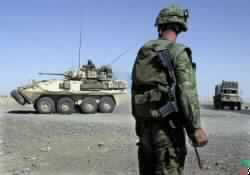HIGHLIGHTSU.S. Forces Could Not Determine Direction Grenades Came From||U.S. & Allied Troops Repeatedly Came Under Attack in Recent Weeks in Afghanistan||Evidence Suggests that Cave Facilities Uncovered By Allied Search Parties Were in Recent Use by Possible Qaeda & Taliban Elements|| STORY: Two rocket-propelled grenades were fired at an airfield in eastern Afghanistan used by U.S. special forces troops, a military spokesman said Monday. No injuries were reported.(Read photo caption)
Col. Roger King said it was not known who fired the grenades late Sunday, which exploded within the grounds of the airfield near the town of Khost. He declined to say how close the explosions were to U.S. forces, though he said no equipment was damaged.
U.S. forces did not return fire because they could not determine which direction the grenades came from, King said. Special forces troops were searching for the source of the attack.
"It was enough of a concern that we wanted to go out and find out who was shooting at us," King told reporters at Bagram air base near Kabul, the capital, which is the headquarters of U.S. military operations in Afghanistan. "But it's not like somebody penetrated our perimeter."
He said the rocket-propelled grenades have a range of about 300 yards.
About 50 U.S. special forces troops are based at the field in Khost, 93 miles south of Kabul, King said.
King also said there had been "sporadic gunfire" near the base during the weekend. He did not elaborate, and it was not clear if the firing was directed at the base. Many Afghans keep weapons, mostly automatic rifles, in their homes for security reasons.
U.S. troops and their allies have repeatedly come under rocket fire in Afghanistan in recent weeks but have suffered no casualties.
Sur Gul, the security chief in Khost, said three rockets were fired in the direction of the Khost airport on Saturday but landed about a mile short.
U.S. and British troops have been searching the area around Khost and other provinces near the Pakistani border for al-Qaida and Taliban fighters. Few fighters have been found.
U.S. troops in Khost also came under rocket fire on June 24 and June 25 but suffered no causalities. They dispatched patrols to search for the source of the firing but the patrol's results weren't immediately known.
It is not known if al-Qaida, the Taliban or local warlords have been firing the rockets.
King said U.S. special forces patrols during the weekend found two large weapons caches in caves in southeastern Afghanistan, the latest in a series of weapons stockpiles uncovered by U.S. and British troops in recent weeks.
He said there were signs of recent activity in the caves, found on Saturday and Sunday with the help of Afghan allies near villages in the hills that separate Paktika and Paktia provinces.
"There were some things that were found that would lead me to believe that this facility was used within the relatively recent past,' King said, without elaborating.
PHOTO CAPTION
A member of the Canadian Army based at the Kandahar Air Base watches the movements of fellow soldiers riding in an armored personnel carrier as they head off of the main road leading into Kandahar, Afghanistan, and onto a desert road Sunday, June 30, 2002. (AP Photo/Charles Rex Arbogas
- Author:
& News Agencies - Section:
WORLD HEADLINES


 Home
Home Discover Islam
Discover Islam Quran Recitations
Quran Recitations Lectures
Lectures
 Fatwa
Fatwa Articles
Articles Fiqh
Fiqh E-Books
E-Books Boys & Girls
Boys & Girls  Articles
Articles










